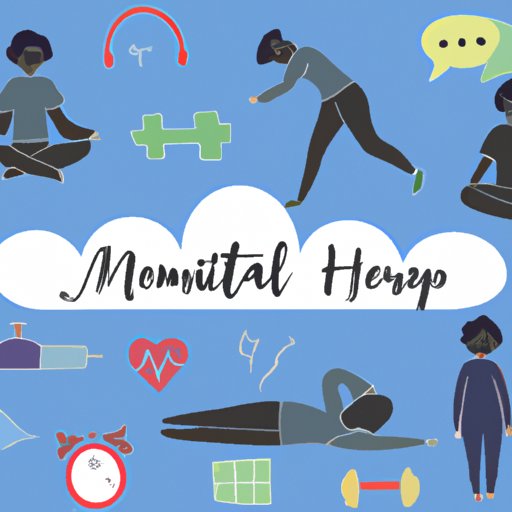Introduction
Mental health is an important part of overall health and well-being. It affects how we think, feel, and act in our everyday lives. Mental health problems can range from mild to severe, and can be caused by a variety of factors such as genetics, stress, trauma, and more. Fortunately, there are many strategies that can be used to improve mental health and well-being.
Exercise Regularly
Regular exercise has been shown to have numerous benefits for mental health. According to the American Psychological Association, physical activity helps reduce stress, improves mood, boosts self-esteem, and can even help with symptoms of depression and anxiety. Exercise can also help improve cognitive function and memory.
Getting started with an exercise routine can be intimidating, but it doesn’t have to be. Start small and set realistic goals. Begin with activities that you enjoy and gradually increase the intensity and duration as needed. Find a workout partner or join a group to stay motivated and accountable.
Get Enough Sleep
Sleep is essential for both physical and mental health. In fact, research has shown that inadequate sleep can lead to poor concentration, irritability, and difficulty managing stress. Getting enough sleep can help improve mood, energy levels, concentration, and overall well-being.
Establishing a consistent sleep schedule can help improve the quality of your sleep. Aim to go to bed and wake up at the same time each day, and avoid using screens before bed. Additionally, create a relaxing bedtime routine that includes calming activities like reading, journaling, and stretching.
Monitor Your Diet
Eating a healthy diet is important for overall health and well-being, and can have a positive impact on mental health. Eating plenty of fruits and vegetables, lean proteins, and whole grains can help improve mood and boost energy levels. Additionally, limiting processed foods, sugar, and caffeine can help reduce stress and anxiety.
Start by making small changes to your diet. Incorporate more nutrient-rich foods into your meals and snacks, and keep unhealthy foods out of sight. Try meal prepping on the weekends to make healthy eating easier during the week. Keep a food diary to track your progress and stay motivated.
Engage in Relaxation Techniques
Relaxation techniques can be helpful for managing stress, reducing anxiety, and improving overall mental health. Popular techniques include mindfulness meditation, progressive muscle relaxation, deep breathing, and guided imagery. Research has shown that these techniques can help reduce symptoms of depression, anxiety, and insomnia.
Start by exploring different relaxation techniques to find one that works best for you. Practice regularly, even if it’s just for a few minutes a day. Make relaxation part of your daily routine and try to incorporate it into other activities like walking or cooking.
Reach Out to Friends and Family
Social support is an important part of maintaining good mental health. Connecting with friends and family can help reduce stress, boost mood, and improve overall well-being. Additionally, having supportive relationships can provide comfort and encouragement when times are tough.
Start by reaching out to friends and family members that you trust. Take time to engage in meaningful conversations and ask for help when needed. Consider joining a support group or online community for additional social support. Make an effort to stay connected even when life gets busy.
Seek Professional Help
Sometimes, professional help is needed to manage mental health issues. A mental health professional can provide guidance, support, and treatment for various mental health conditions. Research has found that therapy can be an effective treatment for depression, anxiety, and other mental health issues.
Take time to research different professionals and find someone who is experienced in treating the issue you’re facing. Ask friends and family for recommendations, and read reviews online. Be honest and open with your therapist and don’t be afraid to ask questions.
Develop Healthy Coping Strategies
Healthy coping strategies can help manage stress, reduce anxiety, and improve overall well-being. Examples of healthy coping strategies include journaling, problem-solving, talking to a friend, going for a walk, and engaging in creative activities. Research has shown that these strategies can help reduce symptoms of depression and anxiety.
Start by making a list of healthy coping strategies that appeal to you. When you’re feeling overwhelmed, take some time to practice one of these strategies. Talk to friends and family about what helps them cope, and consider joining a support group to learn new strategies.
Conclusion
Mental health is an important part of overall health and well-being. There are a variety of strategies that can be used to improve mental health, including exercising regularly, getting enough sleep, monitoring your diet, engaging in relaxation techniques, reaching out to friends and family, seeking professional help, and developing healthy coping strategies.
Making small changes can have a big impact on your mental health. Everyone’s journey is unique, so don’t be afraid to experiment with different strategies and find what works best for you.
(Note: Is this article not meeting your expectations? Do you have knowledge or insights to share? Unlock new opportunities and expand your reach by joining our authors team. Click Registration to join us and share your expertise with our readers.)
